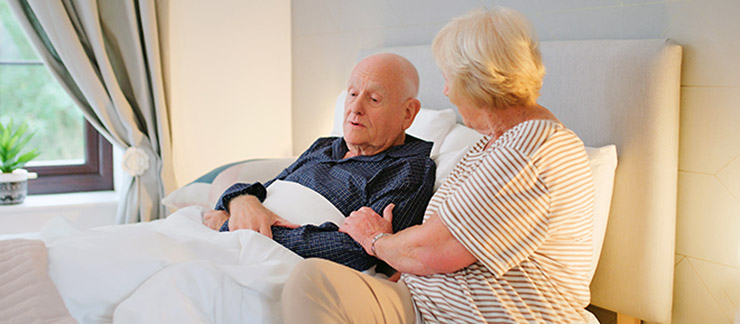
Sundown Syndrome: Practical Tips for Seniors and Families
As the sun sets during the evening hours, a phenomenon known as "sundown syndrome" can cast its looming shadow over many seniors. This frustrating condition, also called "sundowning," can disrupt circadian rhythms and brain function, leading to increased agitation and confusion in elderly individuals during late afternoon and evening. It particularly affects those with Alzheimer's disease or other forms of dementia.
About 20% of people with Alzheimer’s disease may experience sundown syndrome. Symptoms usually worsen as night falls but can occur at any time. While there isn’t a known cause, sundowning may be related to changes in the sleep-wake cycle incurred by Alzheimer’s. Other contributing factors could include:
- Boredom
- Depression
- Fatigue
- Hunger or thirst
- Overstimulation
- Pain
Lack of quality sleep, nighttime pacing, or agitation can lead to elderly falls or other injuries. When seniors get their nights and days mixed up, it can be difficult to plan family outings, doctor visits, and important appointments. With a few small adjustments to the family schedule and home environment, you can help your senior loved one get their sleep-wake cycle back on track.
Tips to Limit Sundowning in Seniors
For many families, environmental changes can help minimize the impact of sundown syndrome symptoms. Here are a few things you can try at home to correct your senior’s nights and days:
- Adjust their sleep cycle
Work with them to get up earlier and go to bed sooner. Setting a regular sleep-wake cycle is important for overall health. Encourage your senior to take naps earlier in the day, if possible. However, if they are sick or require end-of-life care, let them rest when they desire. - Change the lighting
Let natural light into the house during the day and ensure rooms are well-lit until it’s time for bed. Create a calming bedtime routine with dimmer lighting to signal the transition to sleep. - Decrease stimulation
Reduce the noise and stimulation in the afternoon. Play calm music, read, or go for a walk. Try an easy puzzle or a simple household activity like folding towels. When possible, avoid action-packed TV shows and movies in the evening. - Get moving
Ensure your senior gets physical activity or exercise every day. Avoid scheduling too many activities, as overstimulation can be tiring. - Limit caffeine
Coffee, soda, and other sources of caffeine should be limited to the morning. Do not serve alcohol, which can cause confusion and anxiety.
Related reading: How Caregivers Can Help Reduce Elderly Anxiety at Night
When to Talk with a Doctor About Sundown Syndrome
Sometimes the underlying reason for sundowning can be pain from an underlying condition such as a urinary tract infection, sleep disorder, or medication side effects. Resolving the root cause may eliminate sundowning behaviors.
For some seniors, medications can provide relief from sundowning symptoms. Antidepressants, anxiety medication, and antipsychotics can help reduce agitation and inability to sleep. A doctor may recommend taking melatonin, a natural hormone in the body, to help regulate sleep. Talk with your loved one’s doctor about possible medication side effects, which can increase the risk of falls or confusion.
Related reading: Understanding the Stages of Alzheimer’s-Related Memory Loss
Visiting Angels Is Here to Help Alleviate Sundown Syndrome
If you are caring for someone with sundown syndrome, know you are not alone. Let a professional caregiver from Visiting Angels help support you and your senior at home so you both can get the much-needed rest you require to stay healthy and happy.
Schedule your caregiver to visit during the following times:
- In the morning to start the day on schedule
- In the evening for an extra set of eyes if your loved one is prone to wandering
- Overnight so you and your family can sleep knowing your senior is safe
Contact your local home care office to learn how Visiting Angels can support your senior suffering from sundown syndrome. Schedule a free home care consultation today.


